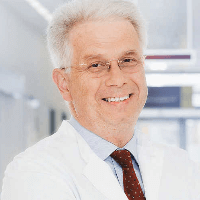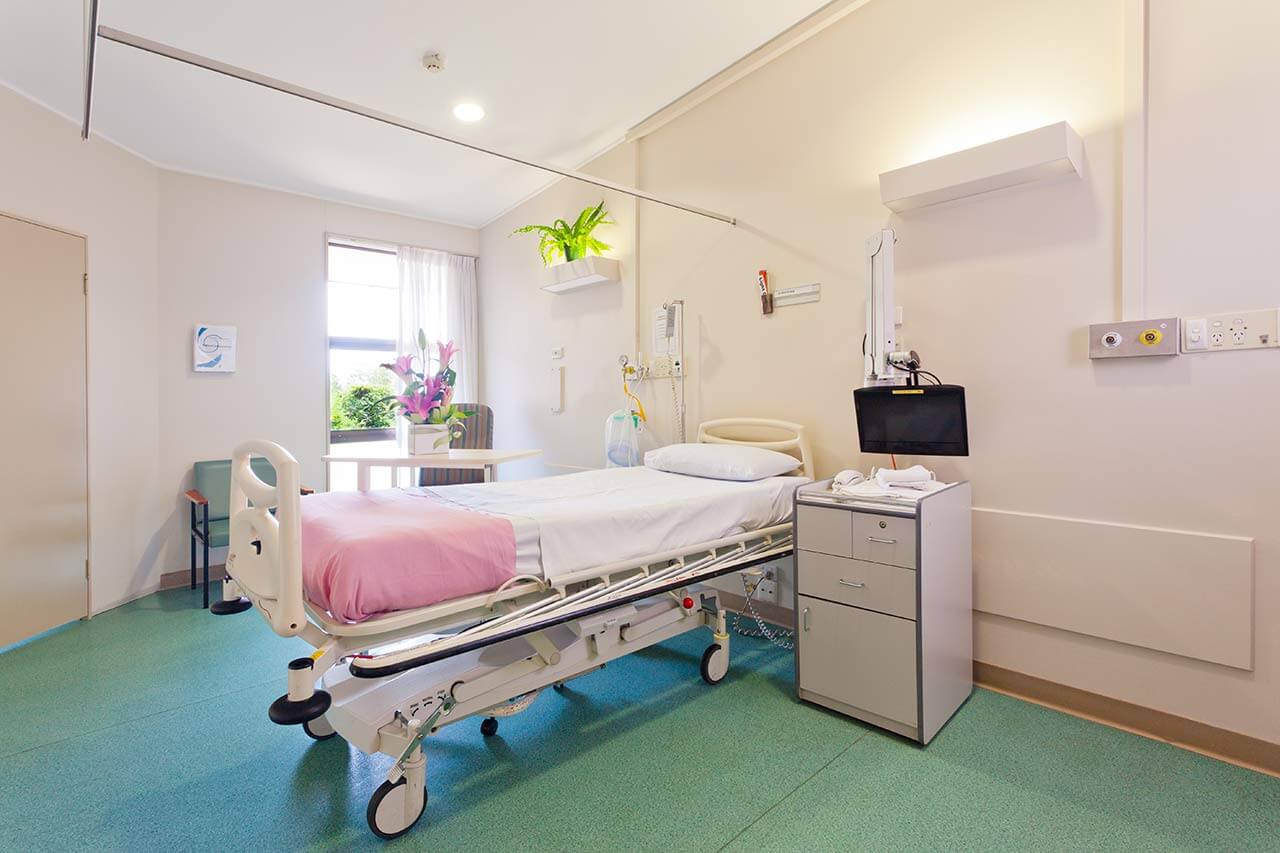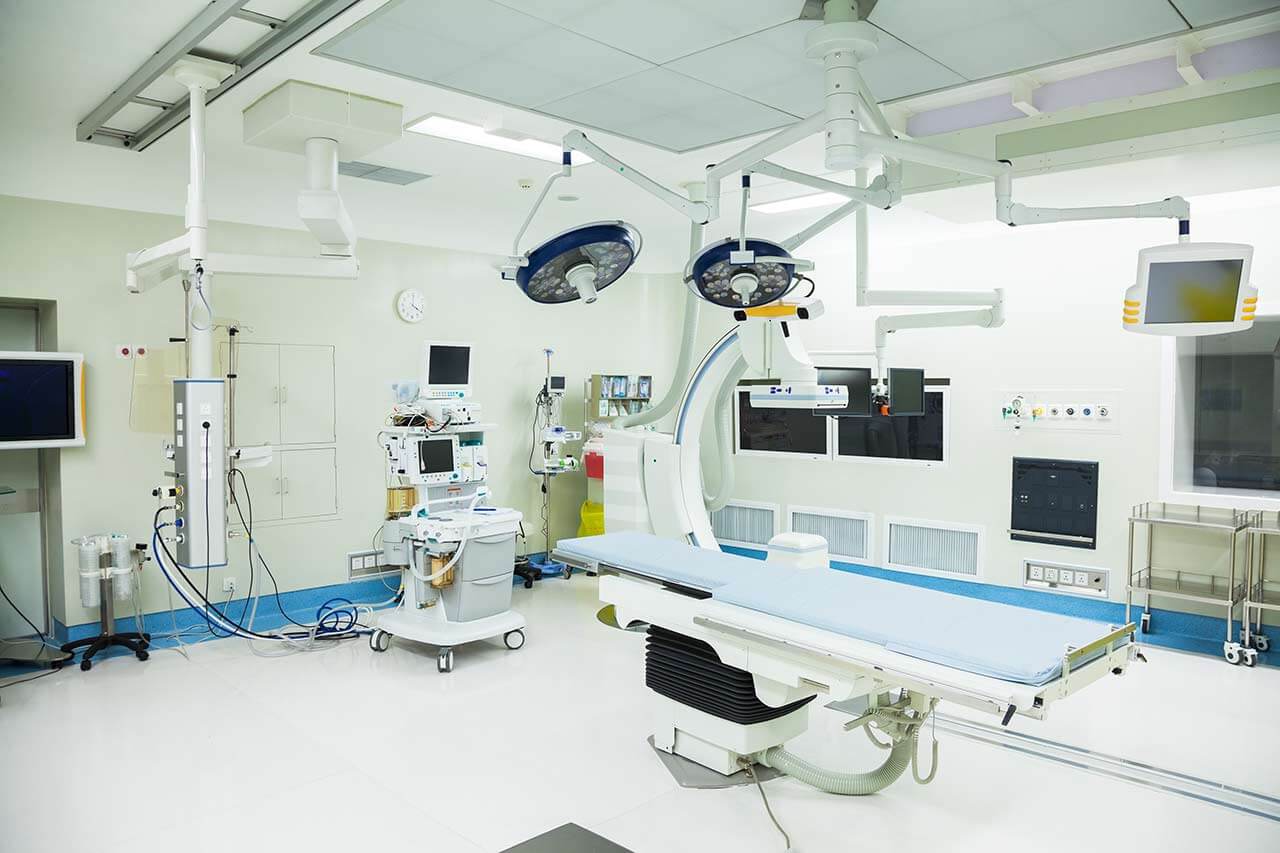
The program includes:
- Initial presentation in the clinic
- clinical history taking
- review of medical records
- physical examination
- laboratory tests:
- complete blood count
- biochemical blood test
- inflammation markers (CRP, ESR)
- blood coagulation analysis (aPTT, PT, INR)
- ultrasound of the abdomen
- gastroscopy
- nursing services
- consultation of related specialists
- treatment by chief physician and all leading experts
- explanation of individual treatment plan
Required documents
- Medical records
- Fibrogastroduodenoscopy (FGDS) (if available)
Service
You may also book:
 BookingHealth Price from:
BookingHealth Price from:
About the department
The Department of Gastroenterology and Hepatology at the Hospital Bogenhausen Munich provides the full range of services for the prevention, diagnostics and treatment of gastrointestinal diseases, including the liver, gallbladder and bile ducts. The primary focus of the department's clinical practice is on the treatment of colon, stomach, pancreatic, liver and bile duct cancers. The department's doctors specialize in the conservative treatment, but if the intervention is required, general and abdominal surgeons are involved in the therapeutic process. Thanks to the collaboration with doctors from related medical disciplines, the patients suffering from cancer can undergo imaging diagnostics, radiation therapy and chemotherapy. The department is certified in accordance with the requirements of the German Cancer Society, so the patients can be sure that they will receive the most effective and tailored treatment here. In addition, the department includes an Endoscopy Unit, whose specialists carry out diagnostic and therapeutic endoscopic procedures. The department treats more than 4,000 inpatients and about 1,000 outpatients every year. The department is headed by Prof. Dr. med. Wolfgang Schepp.
The department's medical team has a wealth of experience in the conservative treatment of colon cancer, which today is one of the most common and dangerous types of oncology. To successfully cope with the pathology, the department uses an interdisciplinary approach – gastroenterologists, oncologists, radiologists, chemotherapists and radiation therapists cooperatively consider each clinical case and thoroughly develop a step-by-step treatment regimen. The specialists always strive to achieve a complete cure, but in case of the advanced stages of colon cancer, the purpose of therapy is to achieve long-term remission. The first thing the doctors do when they suspect colon cancer is colonoscopy. They can often remove polyps and sample tissue for further histological examination immediately during colonoscopy. In addition, the doctors use a special regimen of ultrasound examination during colonoscopy in order to determine the degree of tumor invasion into the colon wall and its spread to the adjacent tissues or organs. Ultrasound scanning also allows the doctors to assess the condition of the lymph nodes in the colon mesentery. However, such imaging tests as CT, MRI, PET and PET/CT are also required to determine tumor location and the stage of colon cancer. After studying diagnostic results, the department's doctors jointly with specialists in the field of radiology, oncology, radiation therapy, chemotherapy, general and abdominal surgery develop an optimal treatment regimen, taking into account the current clinical protocols and recommendations of the German Cancer Society. It is obvious that each clinical case is unique, so the patient undergoes a course of treatment prescribed according to his particular indications. The therapeutic options for patients with colon cancer include surgical resection of the tumor, chemotherapy and radiation therapy. The patients with metastases can undergo radiofrequency ablation, the essence of which is the destruction of metastases using heat. The department also offers such innovative cancer treatments as chemoembolization, immunotherapy and antibody therapy. The patients with incurable colon cancer receive high-quality palliative care. During the entire period of treatment, both patients and their relatives receive care from the experienced psychologists, since many patients and their families find it quite difficult to cope with the emotional shock and fears of the upcoming treatment.
The treatment of gastric and pancreatic cancer is also of particular interest to the department's gastroenterologists. The therapeutic options are almost the same as those used for colon cancer treatment. These are surgery, chemotherapy, radiation therapy, immunotherapy and antibody therapy. Prior to appointing a particular treatment method, the doctors consider each clinical case at an interdisciplinary tumor board. Thus, when developing a treatment regimen, they can consider all the nuances, assess the risks to the patient's health and the predicted results of therapy.
Liver cancer treatment is also within the department's competence. The pathology is most often detected during an ultrasound examination, but to accurately diagnose it, the patient should additionally undergo CT and MRI scanning, a biopsy and a tumor marker test. In many cases, the first-line treatment is surgical resection of the tumor, which is performed in the Department of General and Abdominal Surgery. However, liver cancer is often diagnosed in patients with liver cirrhosis. In such cases, surgery is contraindicated. The main treatments for inoperable liver cancer are chemotherapy and immunotherapy. In addition, cooperation with radiologists allows the department's specialists to use such advanced treatment methods as radiofrequency ablation (destruction of tumor cells using heat), transarterial chemoembolization (injection of chemotherapeutic drugs directly into the tumor and blockage of the blood vessels feeding the tumor) and selective internal radiation therapy (introduction of miniature radioactive seeds emitting radiation at a very short distance through the arteries of the liver directly into the tumor).
Although chronic inflammatory bowel diseases (Crohn's disease and ulcerative colitis) are benign, they can lead to serious complications if treated untimely. The department has excellent facilities for the accurate diagnostics of ulcerative colitis and Crohn's disease. First of all, colonoscopy and gastroscopy are performed. Whenever required, they are followed by ultrasound scanning (also with contrast enhancement), capsule endoscopy or double-balloon enteroscopy, MRI. The laboratory tests are required as well. In most cases, it is impossible to achieve a complete cure for inflammatory bowel disease, and therefore the treatment is aimed at alleviating symptoms and improving the patient's quality of life. The department's gastroenterologists provide effective drug therapy and antibody therapy. Surgical treatment is the last-line therapy. When considering surgery, the specialists thoroughly consider the potential benefits and risks of the intervention. The surgical procedures for Crohn's disease and ulcerative colitis are performed by specialized surgeons in the Department of General and Abdominal Surgery.
The department's range of medical services includes:
- Gastroenterology
- Diagnostics and conservative treatment of colon cancer
- Chemotherapy
- Radiation therapy
- Immunotherapy
- Antibody therapy
- Radiofrequency ablation and chemoembolization
- Palliative care
- Psychological care
- Diagnostics and conservative treatment of pancreatic cancer
- Chemotherapy
- Immunotherapy
- Antibody therapy
- Palliative care
- Psychological care
- Diagnostics and conservative treatment of gastric cancer
- Chemotherapy
- Radiation therapy
- Immunotherapy
- Antibody therapy
- Palliative care
- Psychological care
- Diagnostics and conservative treatment of esophageal cancer
- Chemotherapy
- Radiation therapy
- Immunotherapy
- Antibody therapy
- Palliative care
- Psychological care
- Diagnostics and conservative treatment of chronic inflammatory bowel disease (Crohn's disease and ulcerative colitis)
- Drug therapy
- Antibody therapy
- Diagnostics and conservative treatment of gastroesophageal reflux disease, diverticulitis and gastric emptying disorders
- Drug therapy
- Endoscopic therapeutic procedures
- Diagnostics and conservative treatment of achalasia cardia
- Balloon dilation
- Per-oral endoscopic myotomy (POEM) – innovative technique
- Diagnostics and conservative treatment of chronic abdominal pain, irritable bowel syndrome
- Drug therapy
- Diagnostics and conservative treatment of bleeding in the stomach and small bowel
- Endoscopic therapeutic procedures
- Diagnostics and conservative treatment of pancreatitis
- Drug therapy
- Diagnostics and conservative treatment of hemorrhoids, anal fissures
- Therapeutic endoscopic procedures
- Diagnostics and conservative treatment of colon cancer
- Hepatology
- Diagnostics and conservative treatment of liver cancer, bile duct cancer
- Chemotherapy
- Immunotherapy
- Radiofrequency ablation
- Transarterial chemoembolization (TACE)
- Selective internal radiation therapy
- Diagnostics and conservative treatment of inflammatory liver diseases, liver cirrhosis
- Drug therapy
- Therapeutic endoscopic procedures
- Diagnostics and conservative treatment of cholelithiasis
- Endoscopic retrograde cholangiopancreatography
- Shockwave therapy (for large gallstones)
- Diagnostics and conservative treatment of liver cancer, bile duct cancer
- Other medical services
Curriculum vitae
Higher Education and Professional Career
- Study of Medicine at the University of Bonn, German Academic Scholarship Foundation.
- 1981 Doctorate in Medicine and admission to medical practice.
- 1981 - 1982 Scholar of the German Research Foundation, Institute of Pharmacology, University of Tuebingen.
- Postgraduate training in Internal Medicine, Department of Internal Medicine at the University Hospital Bonn and the University Hospital Rechts der Isar Munich.
- 1988 Board certification in Internal Medicine.
- 1989 Habilitation and PD title.
- 1989 - 1990 Research Fellow at the University of California, Los Angeles.
- 1990 Board certification in Gastroenterology and Senior Physician of the Department of Internal Medicine II at the University Hospital Rechts der Isar Munich.
- 1993 Early appointment as Extraordinary Professor for Excellence in Research.
- 1997 C3 Professorship in Gastroenterology, Faculty of Medicine, Technical University of Munich.
- 1997 Head of the Department of Gastroenterology and Hepatology at the Hospital Bogenhausen Munich.
- 2003 - 2006 Medical Director of the Hospital Bogenhausen Munich.
- 2007 Additional qualification in tumor drug therapy.
Clinical Interests
- Endoscopy and gastrointestinal endoscopic ultrasound examinations, in particular endoscopic treatment of initial stages of cancer of the esophagus, stomach, colon and rectum, diseases of the biliary tract and pancreatic ducts.
- Diagnostics and drug therapy of gastrointestinal malignancies.
Prizes, Awards and Honors
- 1984 Scientific Prize of the German Federal Ministry of Health.
- 1985 and 1994 Honorable Prize for Clinical Gastroenterology of the Bavarian Society of Gastroenterology.
- 1990 Karl Anton Ewald Prize of the German Society for Gastroenterology, Digestive and Metabolic Diseases (DGVS).
- 1991 Tannhauser Prize of the German Society for Gastroenterology, Digestive and Metabolic Diseases (DGVS).
- 1997 Poster Award, German Society for Gastroenterology, Digestive and Metabolic Diseases (DGVS), Ludwigshafen.
- 1998 Digestive Disease Week (DDW) Outstanding Poster Award, American Gastroenterological Association.
- 2001 Poster Award of the German Society for Gastroenterology, Digestive and Metabolic Diseases (DGVS).
- 2007 Incentive Award in Medicine, Munich.
- 2007 - 2016 Regularly ranked among the top German doctors according to the Focus magazine.
- 2011 Ranked among the top 100 German doctors.
Memberships in Professional Societies
- Member of the Commission for Guideline Development for the German Society for Gastroenterology, Digestive and Metabolic Diseases (DGVS): "Gastroesophageal reflux disease" (2004 and 2011, Head of the Commission), "Stomach cancer" (2008), "Helicobacter pylori infection and peptic ulcer disease" (2015).
- Board Member of the Federal Association of Gastroenterology Germany (BVGD).
- Deputy Chairman of the Working Association of Certified Colorectal Cancer Centers (ADDZ).
- Head of the Commission for Medical Classification and Health Care Economics, German Society for Gastroenterology, Digestive and Metabolic Diseases (DGVS).
- Advisory Board Member of the German Society for Gastroenterology, Digestive and Metabolic Diseases (DGVS).
- Board Member of the German Society for Gastroenterology, Digestive and Metabolic Diseases (DGVS).
- President of the 79th Annual Conference (2018) of the German Society for Gastroenterology, Digestive and Metabolic Diseases (DGVS), Munich.
- Member of the United European Gastroenterology.
- Member of the American Gastroenterological Association (AGA).
- German Society for Gastroenterology, Digestive and Metabolic Diseases (DGVS).
- German Society of Endoscopy and Imaging Techniques (DGEBV).
- Gastro Liga, Scientific Advisory Board Member.
- Bavarian Society of Gastroenterology.
- German Society of Internal Medicine (DGIM).
- Bavarian Medical Association.
- German Cancer Society (DKG).
- German Working Group for Internal Oncology (AIO).
- Munich Cancer Center, "Gastrointestinal tumors" Project Group.
Photo of the doctor: (c) München Klinik Bogenhausen
About hospital
According to the reputable Focus magazine, the Hospital Bogenhausen Munich ranks among the ten best medical centers in Bavaria and among the top 50 medical facilities in Germany!
The medical facility is the Academic Hospital of Ludwig Maximilian University of Munich. The modern hospital with the highest level of services annually provides treatment to more than 85,000 patients with clinical cases of varying severity. With 1,000 beds, the hospital is the largest medical complex in the region. It provides both inpatient and outpatient treatment. In addition, the hospital has a 24-hour emergency service. The hospital's medical team consisting of highly qualified doctors and nursing staff focuses on tailored medical care, since they are convinced that every patient and his clinical case is unique. All employees of the hospital strive not only to provide the most effective treatment to the patient, but also to make his hospital stay as comfortable as possible. The work of doctors is based on respect and humane attitude towards their patients.
The hospital includes 18 specialized departments. Each department is responsible for the treatment of a particular group of diseases. The hospital is distinguished by outstanding successes in the treatment of diseases of the cardiovascular system, lungs and airways, gastrointestinal tract, musculoskeletal system, nervous system and metabolic disorders. Of particular interest is the treatment of cancers, which is provided on the basis of the Cancer Center certified in accordance with the standards of the German Cancer Society. The doctors of the hospital have a large arsenal of innovative treatment methods available only in the leading medical centers in Europe.
The high level of medical care is confirmed by the prestigious certificates of professional german medical societies. These are certificates of the German Cancer Society in the treatment of colon, pancreatic and esophageal cancers, a certificate of the German Cardiac Society, a certificate of the German Trauma Society, a certificate of the German Stroke Society and others.
The hospital has excellent conditions for the provision of comprehensive medical care. Long clinical experience of doctors in combination with high-tech medical equipment allows the specialist to work miracles, curing severe diseases, which doctors from other hospitals cannot cope with. The specialists of the hospital take care of both the physical health of patients and their emotional state, devoting enough time to personal communication. The efforts of the medical team are aimed at providing the patient with the most effective treatment and at completу cure of pathology, if possible.
Photo: (с) depositphotos
Accommodation in hospital
Patients rooms
The patients of the Hospital Bogenhausen Munich live in comfortable and cozy rooms with light colors. The hospital offers accommodation in single and double patient rooms. Each patient room has an ensuite bathroom with shower and toilet. The hospital also has patient rooms specially equipped for disabled people. The standard patient rooms include an automatically adjustable bed, a bedside table, a wardrobe, a table and chairs for receiving visitors. The patient rooms have Wi-Fi.
The hospital also offers enhanced-comfort patient rooms with a safe, a mini fridge and upholstered furniture.
The hospital has a library with many interesting books, magazines, CDs and DVDs. For the convenience of patients, the hospital also houses a small shop, a hairdresser and a cafe on its territory.
Meals and Menus
The patient and the accompanying person are offered tasty and healthy three meals a day. The diet is quite varied. Only fresh and high-quality products are used when cooking. Breakfast and dinner are usually served buffet style, while for lunch one can choose from three menus, including a dietary one.
If you are on a specific diet for some reason, you will be offered an individual menu. Please inform the medical staff about your dietary preferences prior to the treatment.
Further details
Standard rooms include:
Religion
The religious services are available upon request.
Accompanying person
During the inpatient program, the accompanying person can live with the patient in a patient room or a hotel of his choice. Our managers will help you choose the most suitable option.
Hotel
During the outpatient program, the patient can stay at the hotel of his choice. Our managers will help you choose the most suitable option.




